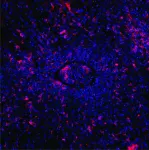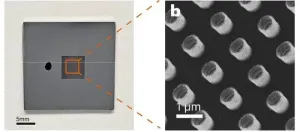(Press-News.org) Some hereditary genetic defects cause an exaggerated immune response that can be fatal. Using the CRISPR-Cas9 gene-editing tool, such defects can be corrected, thus normalizing the immune response, as researchers led by Klaus Rajewsky from the Max Delbrück Center now report in “Science Immunology.”
Familial hemophagocytic lymphohistiocytosis (FHL) is a rare disease of the immune system that usually occurs in infants and young children under the age of 18 months. The condition is severe and has a high mortality rate. It is caused by various gene mutations that prevent cytotoxic T cells from functioning normally. These are a group of immune cells that kill virus-infected cells or otherwise altered cells. If a child with FHL contracts a virus – such as the Epstein-Barr virus (EBV), but also other viruses – the cytotoxic T cells cannot eliminate the infected cells. Instead, the immune response gets out of control. This leads to a cytokine storm and an excessive inflammatory reaction that affects the entire organism.
“Doctors treat FHL with a combination of chemotherapy, immunosuppression and bone marrow transplantation, but many children still die of the disease,” says Professor Klaus Rajewsky, who heads the Immune Regulation and Cancer Lab at the Max Delbrück Center. He and his team have therefore developed a new therapeutic strategy. Using the CRISPR-Cas9 gene-editing tool, the researchers succeeded in repairing defective T cells from mice and from two critically ill infants. The repaired cytotoxic T cells then functioned normally, with the mice recovering from hemophagocytic lymphohistiocytosis. Rajewsky and his team have now published their findings in the journal “Science Immunology.”
Gene repair strategy works in mice
The starting point for the study were mice in which the team could mimic EBV infections. In these animals, the researchers altered a gene called perforin so that its function was completely lost or severely compromised – a common genetic defect in patients with FHL. When they then elicited a condition resembling an EBV infection, the affected B cells multiplied uncontrollably because the defective cytotoxic T cells were unable to eliminate them. As a result, the immune response went into overdrive and the mice developed hemophagocytic lymphohistiocytosis.
The team next collected T memory stem cells – that is, long-lived T cells from which active cytotoxic T cells can mature – from the blood of the mice. The researchers used the CRISPR-Cas9 gene-editing tool to repair the defective perforin gene in the memory T cells and then injected the corrected cells back into the mice. The immune response in the animals quieted down and their symptoms disappeared.
How long protection lasts is uncertain
The first author of the paper, Dr Xun Li, used blood samples from two sick infants to test whether the strategy also works in humans. One had a defective perforin gene, the other a different defective gene. “Our gene repair technique is more precise than previous methods, and the T cells are virtually unchanged after undergoing gene editing,” says Li. “It was also fascinating to see how effectively the memory T cells could be multiplied and repaired from even a small amount of blood.” Cell culture experiments showed that the infants’ repaired T memory cells were capable of a normal cytotoxic T cell response.
This means the therapeutic mechanism works in principle. But before patients can benefit from this discovery, the team needs to first resolve open questions and test the treatment concept in clinical trials. “It is still uncertain how long the protective effect lasts,” says Dr Christine Kocks, a scientist in Rajewsky’s team. “Since the T memory stem cells remain in the body for a long time, we hope the therapy provides long-term or even permanent protection. It is also conceivable that patients could be treated with their repaired T cells over and over again.”
The procedure is minimally invasive since only a small amount of blood is needed, and the mice did not require any preparatory treatment – unlike, for example, with a bone marrow transplant. “We very much hope that our mechanism of action is a breakthrough in treating FHL,” says Rajewsky, “either to gain more time for a successful bone marrow transplant or even as a treatment itself.”
Max Delbrück Center
The Max Delbrück Center for Molecular Medicine in the Helmholtz Association (Max Delbrück Center) is one of the world’s leading biomedical research institutions. Max Delbrück, a Berlin native, was a Nobel laureate and one of the founders of molecular biology. At the locations in Berlin-Buch and Mitte, researchers from some 70 countries study human biology – investigating the foundations of life from its most elementary building blocks to systems-wide mechanisms. By understanding what regulates or disrupts the dynamic equilibrium of a cell, an organ, or the entire body, we can prevent diseases, diagnose them earlier, and stop their progression with tailored therapies. Patients should be able to benefit as soon as possible from basic research discoveries. This is why the Max Delbrück Center supports spin-off creation and participates in collaborative networks. It works in close partnership with Charité – Universitätsmedizin Berlin in the jointly-run Experimental and Clinical Research Center (ECRC), the Berlin Institute of Health (BIH) at Charité, and the German Center for Cardiovascular Research (DZHK). Founded in 1992, the Max Delbrück Center today employs 1,800 people and is 90 percent funded by the German federal government and 10 percent by the State of Berlin.
END
Gene editing precisely repairs immune cells
2024-02-02
ELSE PRESS RELEASES FROM THIS DATE:
COPD: The effect of low-dose cadmium, a highly toxic metal, on airway epithelial cells
2024-02-02
BIRMINGHAM, Ala. – Cigarette smoke exposure is associated with the development and severity of chronic obstructive pulmonary disease, or COPD, which is the third leading cause of death worldwide.
Cigarette smoke contains 2 to 3 micrograms of cadmium, a highly toxic metal and environmental pollutant, per cigarette. Burning tobacco releases cadmium oxide that can be adsorbed onto microparticles in smoke that travel deep into the lungs. Furthermore, the body is not able to remove cadmium, which accumulates in longtime smokers.
In ...
Regulation makes crypto markets more efficient
2024-02-02
First-of-its-kind research on cryptocurrency finds that the most regulated coins create the most efficient markets.
That crypto regulation, often provided by cryptocurrency exchanges like Binance, can also help protect investors by providing reliable, public information.
“Both small and institutional investors should know, if they invest in coins without any regulation, they may suffer from price manipulation or a severe lack of insider information,” said Liangfei Qiu, a University of Florida professor of business and one of the authors of the new study.
“Instead, they may want to invest in coins listed with platforms ...
Centuries-old texts penned by early astronomers Copernicus and Sacrobosco find new home at RIT
2024-02-02
The ancient astronomer Nicolaus Copernicus was the first scientist to document the theory that the sun is the center of the universe in his book, De Revolutionibus Orbium Coelestium (On the Revolutions of the Heavenly Spheres). That first edition book, along with a delicate manuscript from astronomer Johannes de Sacrobosco, that is contrary to Copernicus’ groundbreaking theory, has now found a permanent home at Rochester Institute of Technology.
The texts were donated to RIT’s Cary Graphic Arts Collection, one of the world’s premier libraries on graphic communication history and practices. The donor is Irene ...
Mechanism discovered that protects tissue after faulty gene expression
2024-02-02
The genetic material, in the form of DNA, contains the information that is crucial for the correct functioning of every human and animal cell. From this information repository, RNA, an intermediate between DNA and protein, the functional unit of the cell, is generated. During this process, the genetic information must be tailored for specific cell functions. Information that is not needed (introns) is cut out of the RNA and the important components for proteins (exons) are preserved. A team of researchers led by Professor Dr Mirka Uhlirova at the University of Cologne’s CECAD Cluster of ...
Proteins suggest a path to reduce drug resistance in a form of cancer
2024-02-02
RICHLAND, Wash.—Doctors have nearly a dozen new targeted drugs to treat patients with acute myeloid leukemia, or AML, yet three of four patients still die within five years. Some patients succumb within just a month or two, despite the battery of drugs used to treat the aggressive blood disease, where blood cells don’t develop properly.
A new study draws on a field of science known as proteogenomics to try to improve the outlook. In a paper published Jan. 16 in Cell Reports Medicine, scientists report new ...
Unveiling Oxidation-induced Super-elasticity in Metallic Glass Nanotubes
2024-02-02
Oxidation can degrade the properties and functionality of metals. However, a research team co-led by scientists from City University of Hong Kong (CityU) recently found that severely oxidized metallic glass nanotubes can attain an ultrahigh recoverable elastic strain, outperforming most conventional super-elastic metals. They also discovered the physical mechanisms underpinning this super-elasticity. Their discovery implies that oxidation in low-dimension metallic glass can result in unique properties for ...
Ambitious workers park the office politics when employer is struggling, study suggests
2024-02-02
One of the study authors, Professor Hans Frankort, Professor of Strategy at Bayes Business School, City, University of London, said: “Sports – particularly motorsports – can be a good proxy for several other industries as they are extremely competitive: if you don’t perform and progress you may be out. Workers in sectors such as consultancy and financial services face similar pressures.”
The peer reviewed paper, which has been published on the website of the Academy of Management Journal, found that riders systematically adjusted their internal ...
Speech Accessibility Project begins recruiting people who have had a stroke
2024-02-02
The Speech Accessibility Project has begun recruiting U.S. and Puerto Rican adults who have had a stroke.
Those interested can sign up online.
Funded by Big Tech companies Amazon, Apple, Google, Meta, and Microsoft, the University of Illinois Urbana-Champaign aims to train voice recognition technologies to understand people with diverse speech patterns and disabilities. The project is also recruiting adults with Parkinson’s disease, Down syndrome, cerebral palsy, and amyotrophic lateral sclerosis.
“A stroke can cause big changes, including changes to your ability to speak,” said Mark Hasegawa-Johnson, the project’s ...
Urgent need to address health equity at intersection of American Heart Month and Black History Month 2024
2024-02-02
DALLAS, Feb. 2, 2024 — Black Americans have the highest incidence of cardiac arrest outside of the hospital and are significantly less likely to survive.[1] Cardiac arrest in Black neighborhoods is associated with alarmingly low treatment and survival rates and recent studies have shown lower rates of both bystander CPR and bystander AED use in these neighborhoods. Recognizing the unique intersection of American Heart Month and Black History Month, the American Heart Association, celebrating 100 years of service saving lives, marks the occasion by honoring ...
NRG Oncology selects Health Equity Fellows for 2024
2024-02-02
PHILADELPHIA, PA – NRG Oncology (NRG), a National Cancer Institute (NCI) National Clinical Trials Network (NCTN) group, recently announced that they have named two health equity fellows as a part of the organization’s Health Equity Fellowship Program. Fellowship awardees include Dr. Onyinye Balogun and Dr. Stephanie Rieder.
NRG’s Health Equity Fellowship Program was established by Joan Walker, MD, of the University of Oklahoma and an NRG NCI Community Oncology Research Program (NCORP) Principal Investigator, to train selected ...




